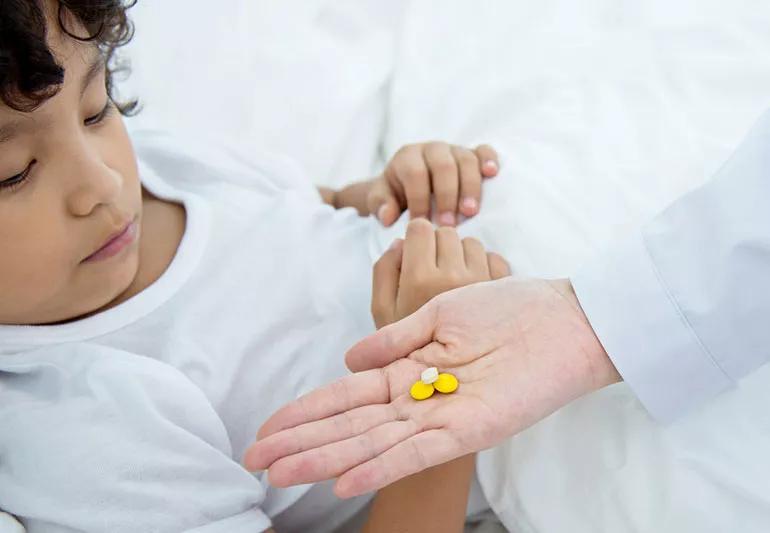Expert advice on helping your child to get better, faster

When your little one isn’t feeling well, they will sometimes put up a fight about taking their medicine — even if they know it will make them feel better. Liquid medicine can taste bad (not all come in grape or bubble gum), and pills can be particularly difficult for them to swallow. One study found that 50% of children have problems swallowing standard-size pills.
Advertisement
Cleveland Clinic is a non-profit academic medical center. Advertising on our site helps support our mission. We do not endorse non-Cleveland Clinic products or services. Policy
Pediatrician Jason Sherman, DO, shares some advice to help you get your child to take their medicine.
Dr. Sherman says it’s easier to teach younger children to swallow pills before they have the chance to develop a fear of them.
“Children who are afraid of taking pills fear they will choke on the pill,” he says. if your child is fearful, remind them that their throat is able to swallow much larger things, like food.
“It’s best to teach your children to take pills early, like when they are 4 or 5 years old — before they develop a fear of swallowing things. Waiting until they are 8 or 9 may be too late,” he says.
Kids tend to mimic their parents when it comes to the ways in which they act and speak – and taking pills is no different. Showing your children how to swallow pills and emphasizing that it isn’t hard to do will reassure them.
It’s important to take an upbeat, positive approach. “When your child is ready, place the pill around your child’s teeth, or toward the back of the tongue, and adjust the chin so the head is tilted back,” says Dr. Sherman. “Tell them to pretend the pill is a piece of food and to swallow it.”
Often children will put a pill in their mouth but won’t swallow it right away. Then the pill coating dissolves and they experience a horrible taste, so they spit the pill out. We’ve all experienced this bitter taste, and it’s no wonder kids are reluctant to take a pill if they’ve experienced this. Unfortunately, many liquid medicines don’t taste great either.
Advertisement
One time-honored solution is to mask the task of medicine with food. Dr. Sherman recommends ice cream or applesauce or any thick food that you can hide the pill in. “Or you can give your kids a popsicle first, which puts a good flavor in their mouth and numbs their tongue, too,” suggests Dr. Sherman. Also, when the tongue is cold, it can’t sense flavor as well.
But what do you do if the medicine is in liquid form?
If you don’t have a popsicle handy, you can put a spoon in the freezer for a few minutes, place it on your child’s tongue, then remove the spoon and give your child the medicine. The cold spoon on the tongue does the same thing as a popsicle – lessening your child’s ability to taste and numbs it a bit.
After your child swallows the liquid medicine, give them something to drink. That will drown out the taste.
You also can ask for a syringe at your local pharmacy and use it to inject liquid medicine into candy, like a peanut butter cup. “The peanut butter and chocolate will disguise the taste without affecting the medicine, and your child will get a little treat,” says Dr. Sherman.
He says almost any food that has a thick consistency will work to hide the medicine. For some kids, orange juice will do the trick, especially if it’s the pulpy kind of juice. But it can be anything with a strong flavor that your child likes.
Gelatin, however, is not a good choice – it’s not as flavorful or cold as other foods, he notes.
Advertisement

Sign up for our Health Essentials emails for expert guidance on nutrition, fitness, sleep, skin care and more.
Learn more about our editorial process.
Advertisement

Most kids start losing baby teeth around age 6 — but there’s some wiggle room in the timeline

From playful movement to strength-building, kids need exercise to stay healthy and strong

Combat summer learning loss and keep young brains engaged with low-pressure learning

Heap on the praise for a job well done and stay consistent

Have their eyes evaluated shortly after birth, before their first birthday, and at ages 3, 5 and beyond

Routine screenings at school are normal and important

Teaching kids how to share at the appropriate age can help them develop social skills and manage their emotions

By disrupting a child’s ability to think and act for themselves, snowplow parents run the risk of delaying their child’s ability to learn

The tropical fruit is a good source of antioxidants and vitamin C

Most people fall asleep within 10 to 20 minutes, but if your experience is different, adjusting your sleep schedule may help

Exploring your hidden side can lead to better understanding of what makes you tick